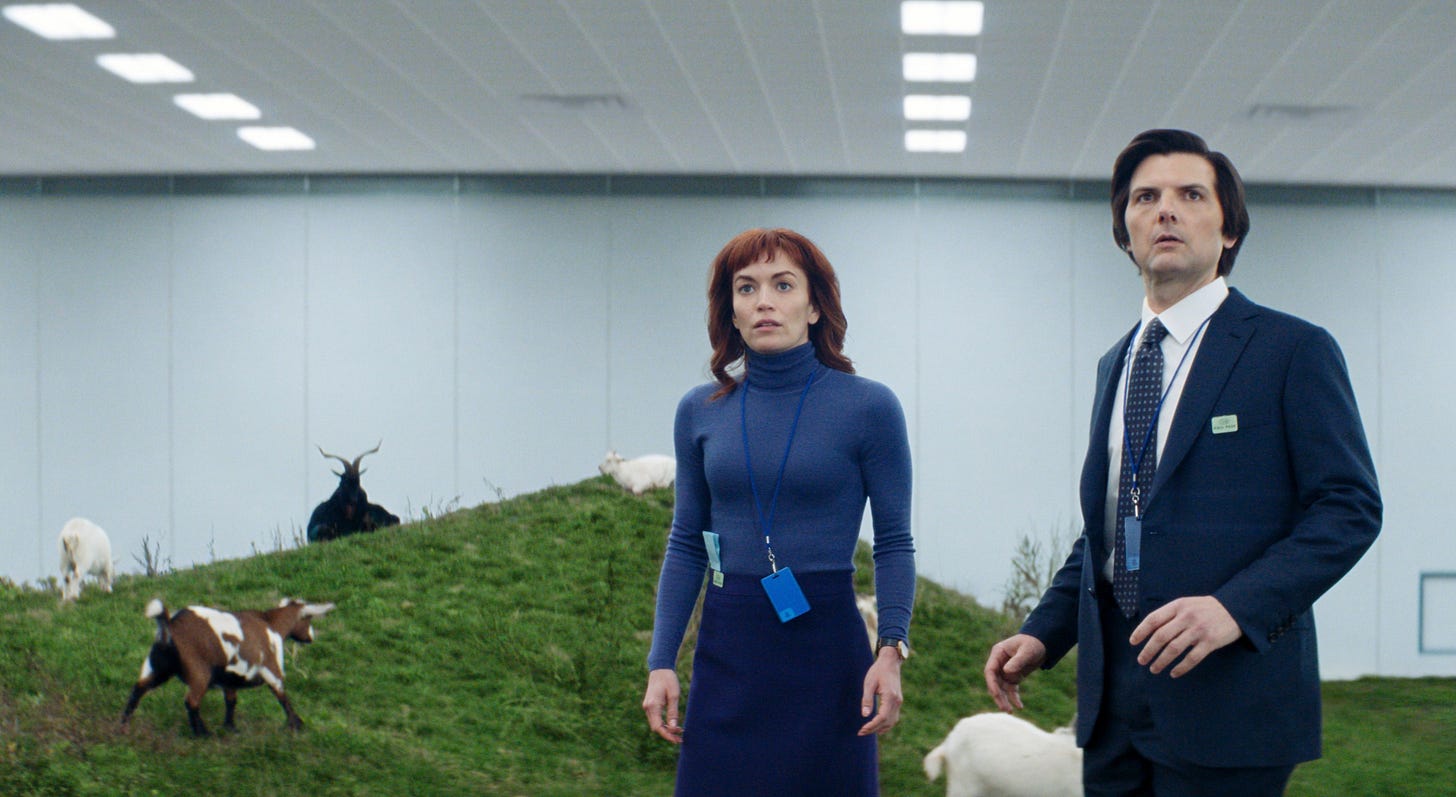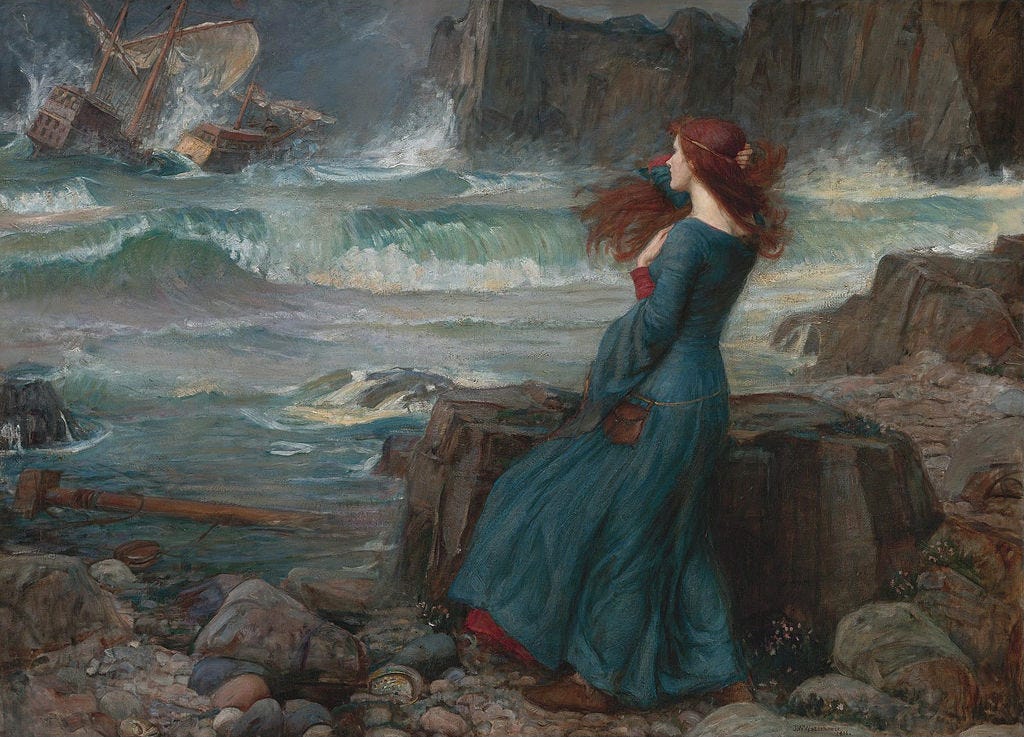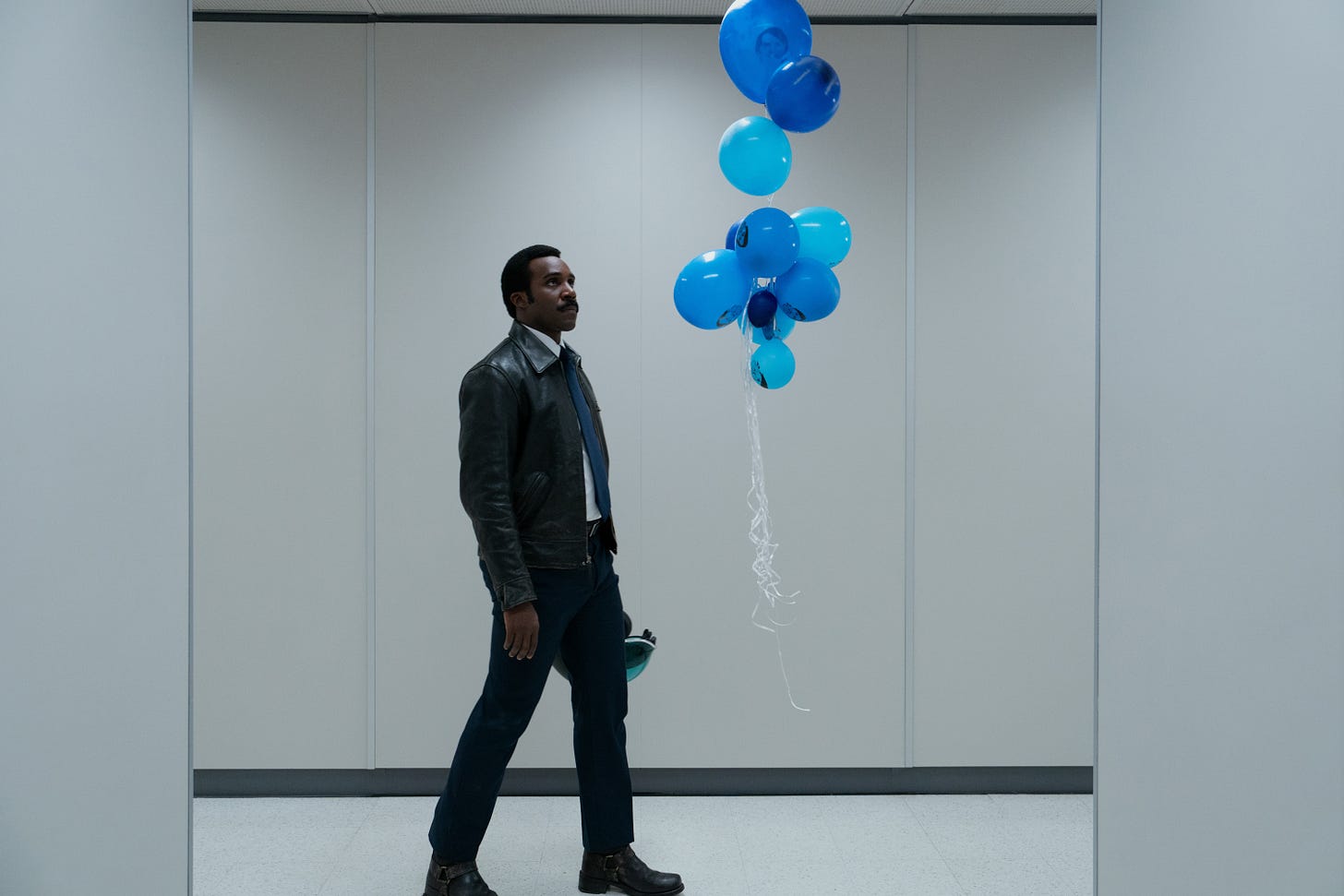Spoilers for Severance (Apple TV+) season one and season two, but spoiler-free for the season two finale.
Severance is one of the few modern TV shows that has had the daring to come up with a new idea. Its premise sounds like that of a workplace comedy: the conceit of the show is that men and women have chosen, by means of a chip in their brains, to separate their work consciousness from their normal consciousness.
It is funny, but it’s a lot of other things as well. It’s technically a “thriller,” according to Apple TV+, and that’s probably the best term for it—it’s full of strange and thorny mysteries, occasional violence, and dramatic twists. But there is plenty of such fare (internet critics tell me that these are called “puzzle box” shows) available to audiences nowadays. I think Severance has become fantastically popular not just because of its originality, but because of its simpler virtues: it is an earnest show, well-acted, one that doesn’t set aside simple human stories to beef up its many mysteries.
That’s a virtue and vice of Season 2: Severance is remarkably willing to wander off into interpersonal dynamics that concern only two or three characters, like Mark and Helly’s tortured love story, Dylan’s romance with his sort-of wife, and the not-quite love triangle of Burt, Irving and Fields. And they aren’t all romantic—Mark and Devon’s relationship as siblings is one of the most powerful and realistic portrayals of a brother-sister relationship I have ever seen in media. Season 1 wove its interpersonal stories together more deftly and moved the plot along more aggressively, but if the show lost some of its speed in Season 2, it didn’t lose its heart.
The thought experiment of Severance, after all, isn’t really “what if you could forget your work life at the end of every day?” And the dominant question of the show isn’t really “What is Lumon doing?” or even “What happened to Gemma?” All of these are interesting and important questions that move the plot along—we wouldn’t have a show without them—but the true thought experiment of Severance is this: what if you could start again? What if there was a version of you that hadn’t experienced any of the things that you wish you could forget? What if you could be reborn?
The show allows us to watch full-grown adults discover the world for the first time. They remember a few things—generic information like U.S. states and how to use a computer—but everything else is totally new to them. So they are fascinated and pleased by tiny things: the “egg bar,” the “music dance experience,” the “waffle party,” a memorial ceremony for Irving where his face is carved out of a watermelon. Sexual awakenings come for the innies at different times, and when they do, they are clumsy and awkward, with an innocence and earnestness that we don’t associate with adults. (After his first kiss with his outie’s wife, innie Dylan desperately proposes to her with a paper ring he made at work).
By making all of these experiences so surreal and aesthetically strange (think mid-century meets brutalist corporate), the show invites us to experience them with the newness that the innies do. At one point, Mark and Helly are wandering through the halls of the severed floor and find a room full of baby goats. The scene immediately became one of the most iconic moments of the show because it was so impossibly unexpected: baby goats in an office building? What if there were goats in your office building? What would you do?
You would be struck with wonder, just as the innies are with everything around them. In contrast with another popular show of the moment, HBO’s White Lotus, which intentionally makes unfamiliar, interesting things like remote locales and impossibly wealthy people feel tired, cynical, and overplayed, Severance takes the most banal setting possible—a modern white-collar workplace—and turns it into a place of mystery and terrifying wonder.
In Shakespeare’s The Tempest, the magician Prospero raises the play’s titular storm in order to shipwreck a group of sailors on the island where he has raised his young daughter Miranda. Miranda, whose name comes from the Latin word for “wonder,” is overcome by wonder when, in a scene toward the end of the play, she sees a crowd of people for the first time: “O wonder! How many goodly creatures are there here! How beauteous mankind is! O, brave new world that has such people in it!” (5.1).
Some suggest that Shakespeare intends Miranda’s speech here ironically, especially when taking into account Prospero’s response: “’Tis new to thee” (5.1). These people she sees are, after all, the erstwhile “bad guys”—Prospero’s brother and his cronies who plotted against his life and sent him and his baby daughter into exile. But I think Miranda’s innocence is meant to remind us of innocence we ourselves have lost. The island of The Tempest is a training grounds for Miranda’s humanity, where she is taught everything she will need for an adult life. It is also a place where we can be taught to wonder at life again—to see a crowd of people and be overcome by the beauty of humanity, not inconvenienced, disgusted, or totally indifferent.
In episode 9, outie Burt admits the real reason he underwent the severance procedure: “You asked me why I severed. I liked the idea that I could be innocent again. Part of me.” As an audience, we met innie Burt first, who was indeed innocent—with some of the clever wariness that characterizes his outie counterpart. Dylan’s wife Gretchen falls in love with Dylan’s innie because he reminds her of who her husband used to be before he became run-down by family life and poverty. Dylan’s innie is totally obsessed with his wife, with a vivid awareness of what theologians and philosophers might call her “givenness”: the fact that she can appear on the severed floor is a miracle to him, like the miracle he experienced at the end of the first season when he realized that he had a child.
“Fairy tales,” writes G.K. Chesterton in his essay “The Ethics of Elfland,” “say that apples were golden only to refresh the forgotten moment when we found that they were green. They make rivers run with wine only to make us remember, for one wild moment, that they run with water.”
It’s hard to make anything feel new nowadays. One of the advantages that I think Shakespeare’s original audiences had over audiences today is that, well, they hadn’t seen much. Seeing a Greek god rise from a hidden trapdoor in a stage with the help of ill-advised pyrotechnics in the original Globe Theatre would easily have been the most exceptional thing an Elizabethan Londoner would see all month—perhaps all year. This loss of novelty is one of the reasons I think modern Shakespeare adaptors want to theme their performances around space, or cowboys, or vampires.1 Though such adaptations are sometimes cringe, they’re arising from a reasonable enough instinct—that the performance won’t, in itself, be novel enough to awaken wonder in its audience.
In The Tempest, Miranda’s speech about the wonder of the world comes at a surprising time. Miranda has been raised on an island full of wonders—in fact, in a sort of pre-celebration of her marriage, her father was just presenting a panoply of spirits portraying traditional Roman goddesses, in one of the scenes that Shakespeare clearly intends as a visual spectacle of dancing and music. When he remembers the plot against his life, Prospero abruptly dissolves the illusion:
Our revels now are ended. These our actors,
As I foretold you, were all spirits and
Are melted into air, into thin air;
And, like the baseless fabric of this vision,
The cloud-capped towers, the gorgeous palaces,
The solemn temples, the great globe itself,
Yea, all which it inherit, shall dissolve,
And, like this insubstantial pageant faded,
Leave not a rack behind. (4.1)
But Miranda’s outburst “O brave new world” is not a reaction to this illusion, but to the concrete and ordinary: at the entrance of a crowd of people who will eventually usher her off the island and into the “real world.”
Nowadays we’ve all seen a lot; we’ve seen more than we ever wanted to. If you’re like me, your daily life is mostly illusions. The illusion of the page that I write on now, ironic takes in an endless cascade on Twitter, polished Instagram photos, a bottomless pit of short videos depicting violence or absurdity. Even daily life—the autopilot that kicks in as you wait at red light after red light, the thousand other autopilots that get us all through every day, sometimes without looking into the eyes of another human being—is largely made of illusions. Many of us don’t need severance to forget our work days.
My mother, an art teacher, often reminded us growing up that it’s easy to think you know what something looks like until you try to draw it. The attentiveness that art requires causes you to snap out of your everyday illusions and really see—to approach reality with wonder. As T.S. Eliot puts it in “Little Gidding,” “We shall not cease from exploration / And the end of all our exploring / Will be to arrive where we started / And know the place for the first time.”
Both Severance and The Tempest are entertainment, a genre that has been easy to malign from Shakespeare’s time to our own. But they are also art. And they make the same suggestion: the strangest thing you’ll see today is not the “insubstantial pageant” of an autopilot life. It’s another human being.
Ok, I’m not going to lie. That Tempest Star Wars/Star Trek adaptation looks like a banger.









This is so, so wonderful. I hadn't directly considered the aspect of innocence in Severance. And the connection to The Tempest is so apt.
This is implied throughout your piece, but another shared aspect between the two is islands. Not quite so literal in Severance as in The Tempest, but the severed floor is like an island to the innies. There's no way out, and the elevator is as impermeable as the ocean is to Miranda (and Prospero). The departments, too, are islanded: Optics and Design has its own community and space, separated from MDR by the twisting hallways. The same is true of the Goat People department, and Choreography and Merriment.
Your comment about Severance's investment in 2-3 character vignettes reminds me of the island-like groupings in The Tempest as well (Trinculo and Stephano with Caliban, Ferdinand with Prospero and Miranda, etc.). I remember watching this season of Severance and thinking about how separated everyone felt.